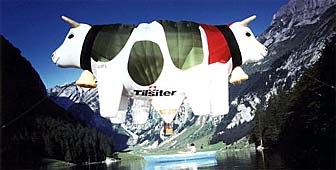Swiss Tilsit cheese returns to its roots

One of Switzerland's best-known products, Tilsit cheese, is being launched in Russia, marking a welcome home for the delicacy, which was first made by Swiss Baptists in the 19th century in the Russian town of Tilsit.
The hard cheese, which is one of Switzerland’s top 10 brands along with Swatch and Rivella, is being marketed to Russians in Moscow and St Petersburg.
But unlike in Switzerland, where Tilsit is an everyday affordable cheese, in Russia it is a veritable luxury.
Lukas Eichenseher, the man who imports Tilsit to Russia, told swissinfo how the quintessentially Swiss product will be an exclusive treat for Moscow’s rich and famous.
“Only the upper class in Russia can afford Swiss Tilsit cheese. Of the 18 million people who live in Moscow, about one million are extremely rich and they are searching for different kinds of specialities including Swiss Tilsit.”
Eichenseher is mounting a costly marketing campaign to launch Tilsit, which is 50 per cent more expensive than other cheeses in Russia. He’s arranged plenty of promotions in top supermarkets and a hot air balloon in the shape of the famous Tilsit cow is temporarily floating in the sky above Moscow.
The Russian launch marks a return home for the much-loved Swiss cheese. It was first made by Swiss Baptists in the 19th century in the Russian town of Tilsit, now called Sowjetsk. They arrived in what was then Eastern Prussia after fleeing Switzerland for religious reasons.
In 1893, the two master cheese-makers, Otto Wartmann and Hans Wegmüller returned home to canton Thurgau in eastern Switzerland and brought their cheese recipe with them. It has been made in Switzerland ever since.
Nowadays Switzerland has over 50 mainly home-run dairies producing the cheese.
swissinfo

In compliance with the JTI standards
More: SWI swissinfo.ch certified by the Journalism Trust Initiative








You can find an overview of ongoing debates with our journalists here . Please join us!
If you want to start a conversation about a topic raised in this article or want to report factual errors, email us at english@swissinfo.ch.